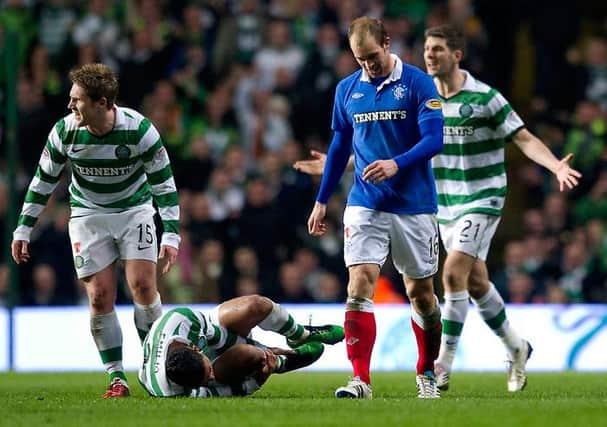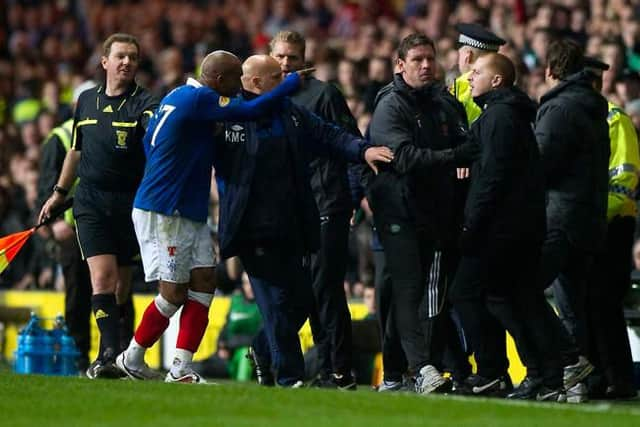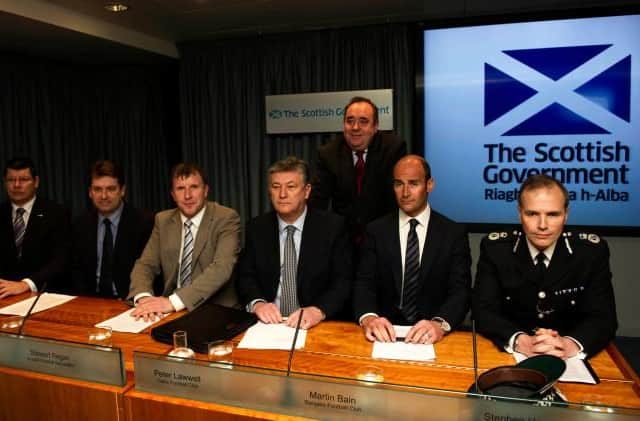Rangers v Celtic: Three red cards, McCoist v Lennon and government summit - the story of last showdown in Scottish Cup last 16


If replays had also been scrapped in the tournament ten years ago, it would have spared everyone involved from a whole lot of bother.
The lazily labelled ‘Shame Game’, which remains one of the most notable episodes in the regularly combustible history of the Old Firm fixture, would never have taken place.
Advertisement
Hide AdAdvertisement
Hide AdWhen the Glasgow giants lined up at Celtic Park on March 2, 2011 for that infamous Scottish Cup fifth round replay, it was their fourth meeting in the space of nine weeks. They faced each other seven times in total that season.


It has, of course, long been a rivalry when the underlying contempt among some of its protagonists needs no help from familiarity in order to be stoked to unhealthy levels.
But in that campaign, the additional fixture prompted by a thrilling 2-2 draw in the initial Scottish Cup tie at Ibrox on February 6 was one which all concerned could have done without.
Celtic’s 1-0 victory, earned by Mark Wilson’s goal just after half-time and fully merited on the night, became almost incidental in the fall-out from a contest which saw three Rangers players sent off and an angry touchline confrontation between the Ibrox club’s then assistant manager Ally McCoist and Celtic boss Neil Lennon immediately after the final whistle.
Hands on the referee


In a match played at breakneck pace and with little flowing football, the incidents on the pitch were far from the most heinous which had ever been witnessed by most long-standing observers of Old Firm combat.
Steven Whittaker’s dismissal after 36 minutes came when he picked up his second caution for a foolish challenge on Celtic left-back Emilio Izaguirre, the Rangers player having earlier been entitled to feel harshly treated when booked for a more innocuous foul on Ki Sung-Yeung.
Madjid Bougherra, booked in the 57th minute for a cynical challenge on Gary Hooper, earned his second yellow in stoppage time for a sliding foul on Kris Commons. The big Algerian defender then added to the febrile atmosphere by laying his hands upon referee Calum Murray as he protested the decision.
“Bougherra subsequently apologised, both publicly in the media and to me personally,” said Murray later. “He said sorry the next time he saw me at a game. It was a case of turn the page and move on. It was a spur of the moment thing, passion.”
Diouf the panto villain
Advertisement
Hide AdAdvertisement
Hide AdBut it was El Hadji Diouf, on loan at Rangers from Blackburn Rovers for the second half of that season, who was the biggest pantomime villain on the night. The Senegalese international, no stranger to being a lightning conductor for controversy throughout his career, had unwittingly given birth to ‘The Broony’ during the first match at Ibrox.
His running battle with Scott Brown led to the Celtic captain meeting him with a fixed-stare, arms wide celebration of his equaliser which forced the replay.
Diouf, booked shortly after Whittaker’s dismissal, was accused by Celtic coach Alan Thompson of ‘throwing one on our physio’ when Izaguirre was being treated in the aftermath of the foul.
A half-time tunnel altercation between Diouf and Celtic assistant-manager Johan Mjallby followed, then at full-time the former Liverpool player’s show of dissent to ref Murray saw him shown the third red card of the night. A defiant Diouf resisted efforts from police and stewards to stop him as he made his way towards the Rangers fans and threw them his shirt.
"He is an easy target for criticism,” was the characteristically phlegmatic observation of Diouf from Rangers manager Walter Smith in the post-match media conference. “He gets himself wound up, as obviously he did at the end of the game."
Summit meeting
The reaction of others was anything but as low key. Like naughty schoolboys, Scottish football’s leading administrators were summoned to a meeting the following week with then First Minister Alex Salmond and Strathclyde Police chief constable Stephen House, the latter concerned by the influence events on the pitch had on 34 arrests made in the stands and a further 187 outside the ground.
But as a piece of political grandstanding, it perhaps suited some of the participants in the run-up to the Scottish Parliament elections two months later.
Later that year, the deeply unpopular Offensive Behaviour at Football and Threatening Communications Bill was passed at Holyrood. It would be repealed in 2018, having been roundly derided by opposition politicians and legal professionals alike for its abject failure to properly address the issue of sectarianism.
Advertisement
Hide AdAdvertisement
Hide AdIt was a classic example of the law of unintended consequences, a chain of events which Scottish football and society might have been spared from but for the random occurrence of a cup replay.
Fines and bans
The Scottish FA’s own disciplinary processes, which would be revamped the following year, saw Diouf and Bougherra fined £5000 and £2500 respectively for their roles in the rumpus. McCoist was handed a two-match ban, which he successfully appealed, while Lennon opted not to contest his four-match suspension.
When the teams reconvened at Hampden for the League Cup Final just 18 days after the Celtic Park shenanigans, they were under the most intense scrutiny imaginable. But Rangers’ 2-1 win after extra time passed off in relative calm, as did the final Old Firm league meeting of the campaign, a 0-0 draw at Ibrox in April.
Rangers went on to clinch the title in Smith’s final season in charge, while Lennon took compensation in the shape of the Scottish Cup as his first piece of major silverware as Celtic manager.
A message from the Editor:
Thank you for reading this article. We're more reliant on your support than ever as the shift in consumer habits brought about by coronavirus impacts our advertisers.
If you haven't already, please consider supporting our trusted, fact-checked journalism by taking out a digital subscription.
Comments
Want to join the conversation? Please or to comment on this article.